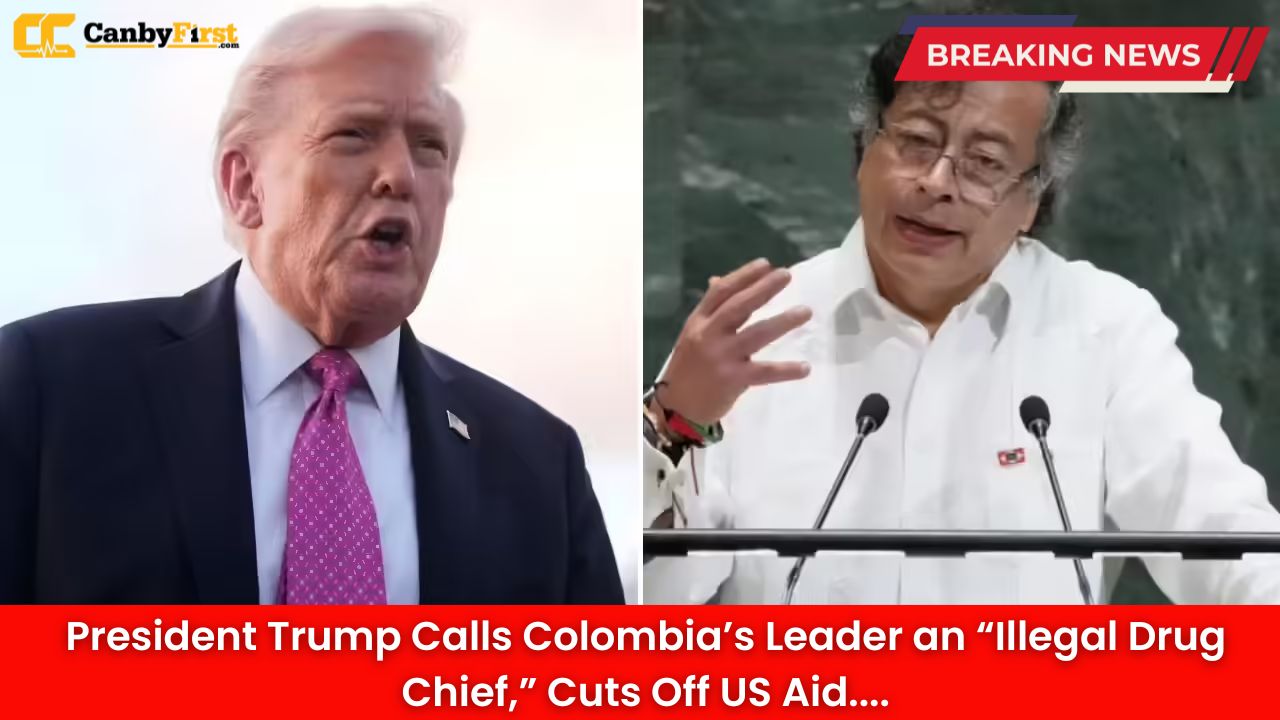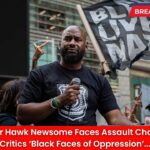Washington, US:
In a stunning diplomatic move that has sent shockwaves through Latin America, President Donald Trump has accused Colombia’s President Gustavo Petro of being an “illegal drug leader” and announced an immediate halt to all US financial aid to the South American nation. The remarks, made during a White House press briefing on Monday, mark a major strain in one of Washington’s most enduring partnerships in the region.
Standing before reporters, President Trump declared that the United States would “no longer bankroll corrupt regimes that profit from the poison destroying American lives,” referring to Colombia’s ongoing coca production and drug trafficking issues. He claimed Petro’s administration had “failed to take meaningful action against narco-terrorism” and suggested that certain officials within the Colombian government were “deeply entangled with cartels.”
Also Read
Colombia Responds with Outrage
From Bogotá, President Gustavo Petro swiftly condemned Trump’s statements, calling them “a grave insult to the sovereignty and dignity of Colombia.” In a televised address, Petro denied any involvement in illegal activities, asserting that his administration had “done more to curb drug trafficking than any in Colombian history.”
He also accused the White House of using Colombia as a political scapegoat, saying, “It is not through insults or threats that nations build trust. Colombia has never been and will never be anyone’s puppet.” The Colombian Foreign Ministry summoned the US ambassador for an explanation and is reportedly reviewing all bilateral agreements related to security and trade.
Aid Freeze Could Hit Key Anti-Drug Programs
The termination of US aid could have major repercussions for Colombia’s anti-narcotics operations, rural development programs, and peace initiatives tied to the 2016 FARC peace accord. Washington currently provides an estimated $400 million annually in assistance aimed at countering drug trafficking and supporting post-conflict stability.
A senior official from the US State Department, speaking on condition of anonymity, expressed concern that the abrupt aid freeze could “undermine years of progress” in curbing coca cultivation and weaken Colombia’s security apparatus in drug-producing regions.
Trump’s Hardline Policy Toward Latin America
Monday’s announcement fits into President Trump’s broader “America First” doctrine, which prioritizes cutting off financial aid to foreign governments deemed “unfriendly” or “ineffective.” In recent months, Trump has escalated rhetoric against several Latin American nations, accusing them of “sending crime and drugs” across US borders.
Analysts suggest the move could appeal to Trump’s domestic base ahead of midterm congressional races, where border security and drug control remain top voter issues.
Regional and Global Reaction
Across Latin America, reactions have been divided. Leaders from Mexico, Argentina, and Chile called for “restraint and diplomacy,” urging both governments to avoid an escalation that could destabilize regional cooperation. Meanwhile, Venezuela’s President Nicolás Maduro seized on Trump’s comments, remarking that “the empire is finally turning on its own puppets.”
International observers, including European Union diplomats, warned that the US–Colombia fallout could embolden criminal networks and weaken international efforts to reduce cocaine exports.
Economic and Security Implications
Economically, Colombia could face a significant blow if US aid is not reinstated. American support helps fund infrastructure, law enforcement, and rural development programs designed to offer alternatives to coca farming. The sudden loss of funds might drive farmers back into the drug trade, further escalating tensions and insecurity in Colombia’s fragile regions.
Security experts also fear that the decision could embolden criminal groups and dissident factions who have been waiting for signs of political weakness. “This could destabilize Colombia’s internal peace efforts,” said one regional analyst. “Drug cartels thrive in power vacuums—and this move risks creating one.”
The White House Stands Firm
Despite sharp criticism, President Trump doubled down on his remarks through his social media account, stating, “The American taxpayer will NOT fund a government that protects drug lords. Gustavo Petro has betrayed his people and the world.” He hinted that more sanctions could follow if Colombia fails to take “tangible action” against illegal narcotics production.
When pressed by journalists about possible diplomatic fallout, Trump dismissed the concerns. “If Colombia wants respect, they have to earn it,” he said. “We’re done being used.”
Petro Faces Political Pressure at Home
Back in Colombia, Petro faces mounting pressure from political opponents who argue that his handling of relations with Washington has been “reckless and ideological.” Protests have erupted in several Colombian cities, with demonstrators split between condemning Trump’s remarks and criticizing Petro’s governance.
The Colombian Congress has called for an emergency session to address the crisis and evaluate potential responses, including seeking new partnerships with China and Russia.
Uncertain Future for US–Colombia Alliance
For decades, Colombia has been the United States’ closest ally in Latin America, particularly in the war on drugs. The Trump administration’s decision now threatens to unravel that long-standing cooperation.
While some observers believe this could be a temporary diplomatic spat, others warn it may mark the beginning of a new, more transactional phase in US–Latin American relations—one where aid and alliance are contingent on aligning squarely with Washington’s policies.
FAQ
What exactly did President Trump say about President Petro?
Trump called Colombia’s president an “illegal drug leader” and accused his government of being complicit in the narcotics trade.
How much US aid does Colombia receive annually?
Colombia typically receives around $400 million each year in military, economic, and anti-narcotics assistance.
Could this affect Colombia’s fight against drug trafficking?
Yes. The loss of US funding could hinder coca eradication efforts and weaken institutions that rely on American support.
Has Colombia responded diplomatically?
Yes. President Petro condemned the comments as “offensive and false,” and the Colombian Foreign Ministry summoned the US ambassador to protest.
What happens next?
Negotiations are expected in the coming weeks, but for now, all US aid to Colombia remains suspended pending further review.












